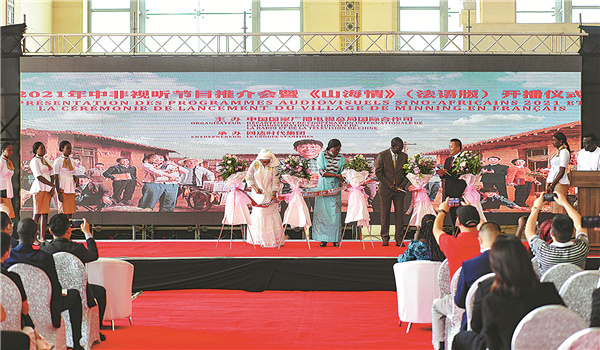

Ever since watching his very first Jackie Chan movie 17 years ago, Bakary Coulibaly has been a fan of Chinese movies and TV dramas.
"The only way to get Chinese movies back then was to buy DVDs, which were all old titles rather than new ones," Coulibaly, a young Malian studying in China, recalls.
In stark contrast, his family back in Africa nowadays can simply turn on the TV and watch a variety of the latest Chinese movies and TV series dubbed and subtitled in French.
In recent years, China's domestic movies and TV series have gone global, with diversified themes and higher production standards, appealing to more people from different cultures.
While the popularity of Chinese movies and TV shows reflecting traditional Chinese culture continues to grow, productions based on the life of contemporary Chinese people and their values are also gaining appreciation among audiences worldwide.
A bunch of Chinese TV dramas are all making inroads into overseas markets-such as Nothing But Thirty, which revolves around the lives of three vastly different women who face the challenges of life in their 30s, or You Are My Glory, a romantic TV drama, which tells the story of a young couple falling in love.
"There used to be a lot of historical and costume dramas that went overseas, but now there are a series of excellent reality-based dramas that are being well-received abroad," says Zhang Yiwu, a professor of Chinese literature at Peking University, talking about the diversified themes of modern Chinese TV series.
Genres such as martial arts, modern life and urban romance dramas are popular among African audiences, says Zhang Jun, director of the Chinese channel of StarTimes, a Chinese media group that has become one of the most influential digital TV operators in Africa.
Domestic sci-fi movie The Wandering Earth, a critically acclaimed box-office hit in China, stunned overseas audiences with its world-class production quality.
Moreover, overseas audiences, especially those in developing countries, are also showing an interest in TV dramas about poverty alleviation in China's rural areas.
Ways of cooperation have also been expanded. Deer Squad, a children's animation presented by iQiyi in cooperation with Nickelodeon, was aired on Nickelodeon International in August 2020. Foreign movie and TV studios also choose to buy remake rights for some popular domestic dramas, in addition to pre-purchasing exclusive overseas distribution rights.
At the same time, Chinese companies have been exploring new channels for movies and TV series to reach global audiences through the internet.
For instance, StarTimes has established subsidiaries in more than 30 African countries, including Rwanda, Nigeria, and Kenya, and has begun digital TV and online streaming operations in most of them. And, in July 2020, iQiyi designated its Beijing office and the Singapore office as the dual headquarters for iQiyi's global operations.
"The increasing number of Chinese movies and TV series going overseas reflects the improvement of China's overall national strength, cultural soft power and cultural influence," says Rao Shuguang, president of the China Film Critics Association.
"Audiences not only see kung fu, but also a modern China and its development," says Coulibaly.
Xinhua